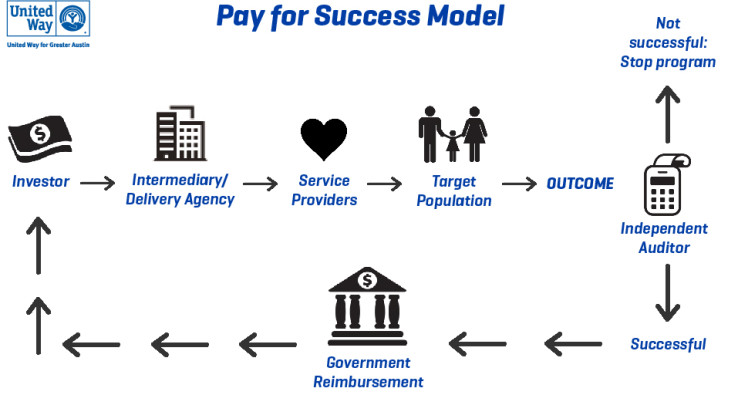United Way for Greater Austin, in partnership with the Austin/Travis County Health and Human Services Dept. and Veterans Service, Central Health and Greenlights, has been elected as part of a national competition to assess the feasibility of implementing a “Pay for Success” initiative. The goal of the initiative is to reduce teen pregnancies among Hispanic youth and to improve birth outcomes among African Americans.
Pay for Success (PFS) is an innovative funding model that enables communities to access greater resources in order to tackle complex social problems by tapping private investments for the upfront costs of the programs. If the programs are successful in delivering services that measurably improve the lives of people it is meant to serve, then the government repays those who made the original investment. This ensures that taxpayer dollars are being spent only on social programs that actually deliver measurable results.
Austin/Travis County was chosen among six other U.S. cities who submitted applications to Third Sector Capital Partners, Inc., the organization conducting the contest. Awardees will receive federally-funded technical assistance throughout 2015 for their various early childhood and youth development projects. The Austin/Travis County nonprofits and government entities involved were selected for their demonstrated commitment to funding high-quality, effective social interventions that produce real outcomes in the area of early childhood and youth development.
The Austin/Travis County feasibility study will result in an assessment of two initiatives—Maternal Infant Outreach Program (MIOP) and Peer-to-Peer Teen Pregnancy Prevention and Empowerment Program (P2P)—to determine if Pay for Success should be implemented to advance the work in one or both programs.
Mayor Steve Adler is highly supportive of both initiatives.
“I am thrilled to hear that the Austin/Travis County Health and Human Services Department and its partners are recipients of this highly competitive Pay for Success feasibility study grant,” Adler said. “This is a step in the right direction to determine how our local government and philanthropic leaders can work together to improve social outcomes while saving tax dollars for the entire community. I look forward to supporting this initiative any way that I can.”
The Maternal Infant Outreach Program’s primary focus is on improving birth outcomes among low-income African American women in Travis County and reducing the disparities in birth outcomes between African American women and women of other races/ethnicities. MIOP employs African American Community Health Workers (CHWs) to provide low-income African American women in Travis County with free services, including referrals, health education, assistance navigating health and human services systems, one-on-one home visits, emotional support, birth education, and labor and delivery support.
Peer-to-Peer Teen Pregnancy Prevention and Empowerment Program works with male and female Hispanic youth ages 13 through 19 in Travis County, with a focus on participants from families below 200 percent of the Federal Poverty Level, Medicaid/CHIP beneficiaries and the uninsured to reduce teen pregnancy. The program uses ¡Cuídate! (Take Care of Yourself)—an evidence-based comprehensive sexual health education curriculum for adolescents designed to reduce sexual risk behaviors. The theory-based curriculum, which is culturally specific to the Hispanic community, has been shown to reduce sexual activity and increase condom use among adolescents. In 2012, there were 413 births to mothers aged 17 or younger in Travis County. An overwhelming majority of those infants, 81.4 percent, were born to Hispanic adolescents.
UWATX’s Vice President of Strategic Programs, Dr. Leah Newkirk Meunier, has been championing the Third Sector application for United Way.
“United Way for Greater Austin began this process with a vision to form a task force to explore an innovative way to address social issues in our community,” Meunier said. “We are thrilled that this partnership of nonprofits and government agencies was selected to work with Third Sector, and we look forward to exploring the opportunity of advancing Pay for Success to reduce teen pregnancy and improve birth outcomes in our under-served communities.”

